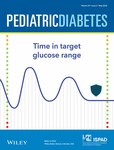The impact of hypoglycaemia in children and adolescents with type 1 diabetes on parental quality of life and related outcomes: A systematic review
Funding information: This project has received funding from the Innovative Medicines Initiative 2 Joint Undertaking (JU) under grant agreement No 777460. The JU receives support from the European Union's Horizon 2020 Research and Innovation Programme and EFPIA and T1D Exchange, International Diabetes Federation (IDF), The Leona M. and Harry B. Helmsley Charitable Trust. C.H. and J.S. are supported by core funding to the Australian Centre for Behavioural Research in Diabetes provided by the collaboration between Diabetes Victoria and Deakin University.
Funding information: Innovative Medicines Initiative; Deakin University; Diabetes Victoria; The Leona M. and Harry B. Helmsley Charitable Trust; International Diabetes Federation (IDF); T1D Exchange; EFPIA; European Union's Horizon 2020 Research and Innovation Programme; Innovative Medicines Initiative 2 Joint Undertaking (JU), Grant/Award Number: 777460
Abstract
This systematic review aims to summarize and critically evaluate the current evidence regarding the impact of hypoglycaemia in children and adolescents with type 1 diabetes on parental quality of life. MEDLINE, PsycINFO, CINAHL, and the Cochrane Library were searched. Inclusion criteria were: 1) quantitative design, 2) included parents of children or adolescents with type 1 diabetes, 3) assessment of hypoglycemia in children/adolescents with type 1 diabetes, 4) assessment of parent quality of life (or related domains of life), and 5) analysis of the relationship(s) between the child's hypoglycaemia and parents' quality of life. The data were summarised in accordance with Synthesis Without Meta-Analysis Guidelines. Twelve studies were included, reporting data from 1895 parents across six countries. Ten studies were cross-sectional; two included prospective data. Evidence suggested that greater frequency and severity of hypoglycemia was associated with greater parental fear of hypoglycemia, emotional distress and family burden. Children's hypoglycaemia has a negative impact on the well-being of parents, but there is an absence of evidence regarding the impact on their overall quality of life. Research into the hypoglycaemia-specific quality of life of parents is needed to explore the impact on various areas, such as social and physical dimensions.
CONFLICT OF INTEREST
The authors declare no potential conflict of interest. All authors approved the final version of the manuscript.
Open Research
DATA AVAILABILITY STATEMENT
The data that support the findings of this study are available from the corresponding author upon reasonable request.




